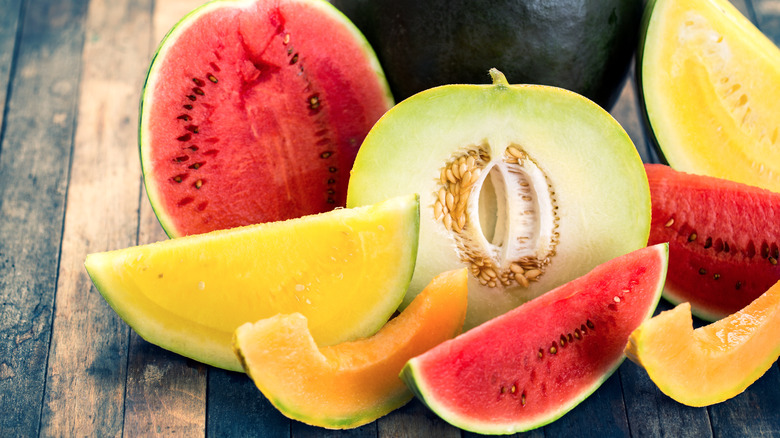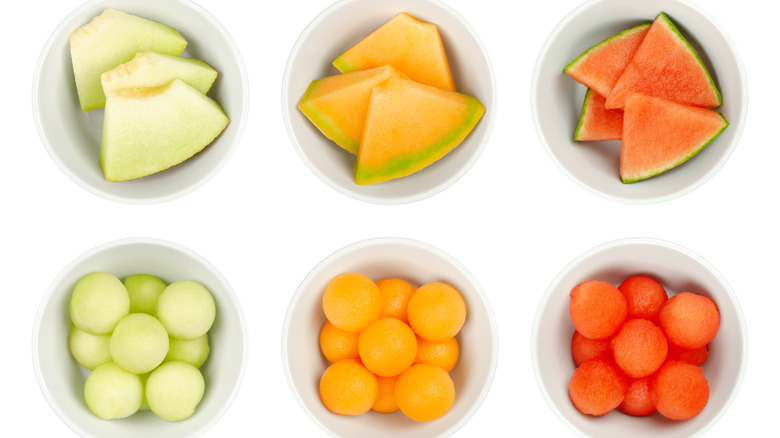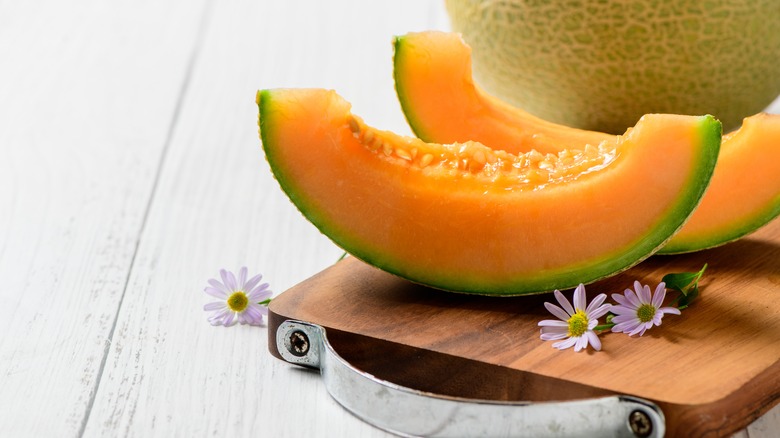Is There A Nutritional Difference Between Cantaloupe And Watermelon?
Cantaloupe and watermelon are quite distinguishable. Both possess a thick outer rind, but the colors are different. Slice into cantaloupe's light green rind, and you'll discover a soft, orange flesh that is juicy and ripe (via Arkansas University). The seeds are centralized within the fruit's core, so there's no need to pick them away as you take each bite. According to Lacademie, there are five original cantaloupe varieties.
Watermelon's pink watery pulp is also juicy, with a scattering of black seeds throughout. There are also seedless varieties which some people find more convenient to eat. Yellow, orange, tiny-sized, and even square-shaped watermelons are also available (via Watermelon).
Two of the most popular summertime fruits stand head-to-head regarding nutritional benefits. While some watermelon and cantaloupe have no flavor, if you manage to pick a well-watered and ripe melon, they can both pack delicious flavor just waiting to be explored. The juicy fruits are refreshingly thirst-quenching, but which is best for your body? Let's dive into the nutritional differences between these two sweet melons.
Cantaloupe vs. Watermelon: Calories, Carbs, and Sugar
At first glance, it's easy to see the distinction between cantaloupe and watermelon. After cutting into the rind, you'll also see the differences inside the fruit. According to Healthline, cantaloupe is made of 90 percent water and contains 53 calories per cup (via Mayo Clinic Health System). Watermelon is comparable, with a composition of 92 percent water and 46 calories per cup.
The carbohydrate count between the two melons is also comparable. According to Souper Sage, watermelon has 7.6 grams of carbs, while cantaloupe has 8.2 grams per 100 grams of fruit.
Watermelon is one of the sweetest fruits you can consume. If sugar is your concern, be aware that a single wedge of watermelon packs 18 grams of sugar (via Atkins). The melon is comprised of a whopping 94 percent sugar from carbs (via Souper Sage)! On the other hand, cantaloupe contains only eight grams of sugar per 100 grams and is made of 89 percent sugar from carbs.
Cantaloupe vs. Watermelon: Vitamins and Minerals
According to Healthline, cantaloupe's coral-colored flesh is very high in beta-carotene (vitamin A), which supports eye health, healthy blood cells, and a healthy immune system. It also contains vitamin C, folate, potassium, fiber, and a wealth of other vitamins and minerals. These components encourage proper water balance between the body's cells, reduce the risk of heart disease and diabetes, may reduce some cancers, and helps fight some diseases. Healthline says that cantaloupe is a well-rounded fruit choice.
Watermelon's juicy pink pulp contains vitamins and minerals that help to lower blood pressure, balance blood sugar levels, and reduce muscle fatigue. According to Healthline, vitamin C, potassium, vitamin B5, vitamin A, and copper round out watermelon's top vitamins and minerals. It is low in antioxidants, but it has high levels of lycopene and citrulline. These two amino acids are potent plant compounds with many benefits, including ridding the body of harmful substances, lowering blood pressure, and improving athletic performance (via WebMD).
While they can vary, cantaloupe and watermelon are two melons that reap profound health benefits. So, which will you choose to quench your thirst this summer?


